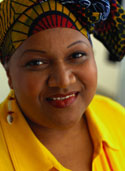|
Women's Reproductive Health:
Menopause |
|
 Menopause is a normal change in a woman’s life when her period stops. A
woman has reached menopause when she has not had a period for 12 months in a
row. During menopause a woman’s body slowly makes less of the hormones
estrogen and progesterone. This often happens between the ages of 45 and 55
years old. Some women may experience menopause at younger ages because of
medical treatments such as surgery to remove the ovaries (sometimes done at
the same time as a hysterectomy), family history (genes), or cancer treatments
such as chemotherapy or radiation to the pelvic area. According to U.S.
Census data from 2000, there are about 37.5 million women reaching or
currently at menopause (ages 40 to 59). Menopause is a normal change in a woman’s life when her period stops. A
woman has reached menopause when she has not had a period for 12 months in a
row. During menopause a woman’s body slowly makes less of the hormones
estrogen and progesterone. This often happens between the ages of 45 and 55
years old. Some women may experience menopause at younger ages because of
medical treatments such as surgery to remove the ovaries (sometimes done at
the same time as a hysterectomy), family history (genes), or cancer treatments
such as chemotherapy or radiation to the pelvic area. According to U.S.
Census data from 2000, there are about 37.5 million women reaching or
currently at menopause (ages 40 to 59).
As women near menopause, they may have symptoms from
the changes their body is making. Some women may not have any other symptoms
at all. Symptoms that some women experience near menopause include hot
flashes (getting warm in the face, neck, or chest), night sweats or sleeping
problems that led to feeling tired, stressed or tense, vaginal changes (the
vagina may become dry and thin and sex may be painful) and thinning of
bones, which may lead to loss of height and bone breaks. If a woman would
like to treat her symptoms, she should talk to her health care provider to
discuss treatment options.
Division of Reproductive Health's:
Fertility Epidemiology Studies (FES)
Fertility Epidemiology Studies (FES) conducts epidemiologic research
and surveillance on fertility and other reproductive health issues
throughout the lifespan, including contraceptive safety and efficacy,
prevention of unintended pregnancy, menopause, and hysterectomy.
Menopause and
Hormone Therapy (womenshealth.gov)
Menopause and
Menopause Treatments Fact sheet (womenshealth.gov)
Also available in
Spanish
Menopausal Hormone Therapy
Information (National Institute of Health)
Results from the Women’s Health Initiative (WHI)
research program.
Age Page: Menopause (National Institute on Aging)
Describes menopause—what happens in a woman’s
body leading up to and after her last period and what changes to expect
after that transition.
Guidance on Menopausal
Hormone Therapies (Food and Drug Administration)
Science-based informational materials from FDA.
Medline Plus (National Library of Medicine)
Conduct a search for more information about menopause and other
health topics.
QuickStats:
Annual Rate of Visits to Office-Based Physicians and Hospital
Outpatient Departments During Which Combination Estrogen-Progestin
Hormone Therapy Was Prescribed for Women Aged >40 years, by Age
Group—United States, 2001–2003
Source: MMWR
2006,55(38);1047.
Hormone
Replacement Therapy: Knowledge and Use in the United States
 View PDF 2.4MB View PDF 2.4MB
This chartbook offers researchers, healthcare professionals, and
policy makers an inventory of information available about HRT use
from recent nationally representative data collected by NCHS.
NAMS (North
American Menopause Society)*
Pause—your complete guide to midlife
health (American College of Obstetricians and Gynecologists)*
Search PubMed for articles on Menopause
This search is being conducted on PubMed an NLM/NIH service.
|
* |
Links to non-Federal organizations found at this site are provided solely as a service to our users. These links do not constitute an endorsement of these organizations or their programs by CDC or the Federal Government, and none should be inferred. The CDC is not responsible for the content of the individual organization Web pages found at these links.
|
|
|
To learn more about PDF
 files and to download PDF files, you need Adobe Acrobat Reader software, which is available free of charge from Adobe.
The HTML version alters the format of the original printed document. Using the PDF version
will preserve the document's formatting and graphics.
files and to download PDF files, you need Adobe Acrobat Reader software, which is available free of charge from Adobe.
The HTML version alters the format of the original printed document. Using the PDF version
will preserve the document's formatting and graphics.
|
Date last updated: 2/7/2012
Date last reviewed: 2/7/2012
Content source: Division
of Reproductive Health,
National Center for Chronic
Disease Prevention and Health Promotion
|